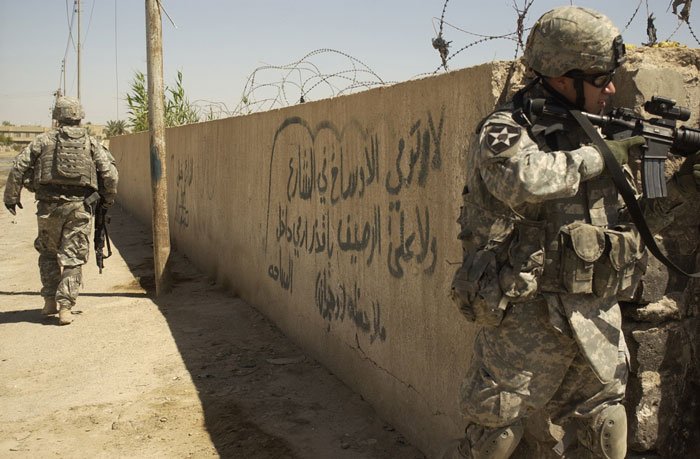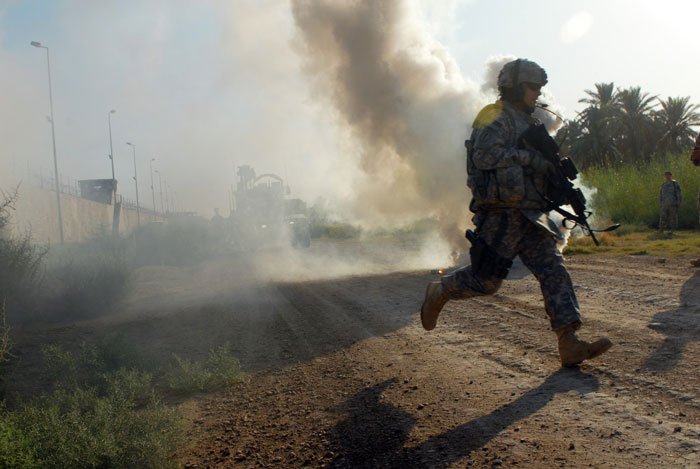I Used to Think That Going to War Was Romantic. It Seemed Like Another World.
Active-duty service members and veterans thinking of harming themselves can get free crisis care. Contact the Military Crisis Line at 988, then press 1, or access online chat by texting 838255.
The Sergeant was living in a car when I met him. After we both swiped right on a dating app, we convened at a park gazebo overlooking the Connecticut River. What might have been a deal-breaker for some women led to my life’s longest and most significant relationship.
I saw him from a distance, waved, and he smiled back. His teeth were perfectly aligned. As I got closer, I noticed they were yellowed and browned from what I assumed was 10 years of Army chain-smoking and tobacco use. I found this charming.
We kissed in the gazebo until it was getting dark out.

His mouth tasted of tobacco, but I didn’t mind. Months later, I’d learn that lots of people in the military became smokers, partially to get a five-minute break to themselves.
The Sergeant and I returned to our cars as dusk approached. I felt the calluses on his hand as he entwined it with mine. Those hands were unlike anything I’d ever known—dry, cracked, weathered like a 19th-century New England farmer.
He was proud of the callouses, especially the one on the first finger of his right hand. “That’s my trigger finger,” he smiled.
I felt a sudden chill on that humid summer evening.
Sensing my interest, he pulled a camo rucksack out of the back seat of the Subaru he was living in. He opened the backpack and dumped its contents onto the pavement.
“Dirt?” I said.
“Sand,” he said. “You smell that?”
I stooped down and touched the sand. The smell was pungent, wild.
“That’s Afghanistan,” he said with a wink. I was sold on this guy.
It kind of smelled like Paris.
* * *
I used to think that going to war was romantic. The uniforms, the valor, the belt buckle my grandfather took off a dead German when the fighting was over on Utah Beach. It seemed like another world entirely.
Over the next few weeks, I learned the searing and decidedly unromantic nature of the Sergeant’s pain.
Award-Winning Journalism in Your Inbox
He deployed to Iraq in 2004 and Afghanistan in 2010. Those were big years for IEDs and suicide bombs. He had lost a total of seven brothers-in-arms during overseas combat. After and in between deployments, he’d lost even more to suicide.
The Sergeant even tried it once himself. Suicide. I asked why.

“Because there’s so much to worry about over here,” he said, the most vulnerable thing I’d gotten from him so far. “And there’s only one thing to worry about over there.”
“A flirtatious camel?” I batted my eyelashes.
He scowled at my ill-timed levity and stared into my eyes: “Not gettin’ dead.”
* * *
Your soldier will sometimes tell you things you don’t want to hear, but you will listen because you love him. Body parts. Rocket launchers. IEDs. The glare of a silver flip phone before it is raised in the air to detonate a suicide bomb.
A friend he cut down from a rope in his locker.
“You cut down a friend from a rope in his locker?” I felt sick.
“No,” he said. “Well, it was a long time ago.”
* * *
The first night we spent in our new apartment together—we’d found a veterans charity willing to pay the security deposit on a two-bedroom place—I heard the Sergeant scream.
“DIE, MOTHERFUCKER, DIE!” he shouted in a voice louder than I’d ever heard him use in waking life.
His Sergeant’s voice, I realized. He had promised never to use it with me.
He began to relax when I cuddled against him, hoping not to trigger anything, and it worked.

The words he used were no accident. In the dream, he was back in Iraq. “Die, motherfucker, die,” was the precise rhythm to use when you’re firing the weapon.
He was the most interesting person I had ever met.
* * *
Once, in our early days, the Sergeant pointed out how Jake Gyllenhaal’s character should be dead in Jarheads. “You can’t smoke at night over there,” the Sergeant said with condescension aimed at the producers. His eyes flashed angrily at the TV as he inhaled his bargain-brand cigarette.
“See how the end of it is red? You can see that from like, a mile away.”
“So?”
“Gives enemy a clear shot.” I could tell he wanted to reach into the TV, enter the war, and take the cigarette out of Jake Gyllenhaal’s hand. He wanted to correct it.
* * *
I came home from work, and the Sergeant was lying on the couch facing inwards.
“Specialist Beck,” he said into the couch.
“What? You’re muffled.”
“Specialist Beck!” he bellowed. “He’s dead!” His face was red and full of snot and tears. He searched my face.
Then I remembered. “Jimmy?”
I’d known him, too. He had a wife. And kids.
I found the obituary online. “Died suddenly,” I said out loud.
In a veteran’s obituary, this is a typical euphemism for “shot himself.”
The Sergeant moaned. “Why didn’t he just ask for help?” Then, answering his own question, “It’s the VA,” he seethed. “This shit is on them.”
* * *
Specialist Beck used a handgun to blow out his brains inside his truck after learning his unit was going to deploy another year to Afghanistan.
Now that’s pageantry, I thought. Like a Samurai gutting himself.
This shit was officially Shakespearean.
* * *
Later that day, upon hearing the news, a fellow infantryman came calling. He was here to check in on the Sergeant about the latest casualty.
“Another grunt down, man,” he said.
“A grunt?” I interrupted, knowing he wouldn’t mind. One thing soldiers love is genuinely impressing civilians.

He smiled. “Grunts. It’s what we call infantry.”
“It means we run toward bullets like oafs,” added the Sergeant. “Nothing but bullet sponges.”
They laughed, eyes gleaming.
Bullet sponges? I felt a flash of inner delirium. As a writer, I felt it my duty to keep track of these evocative phrases, but Jesus fucking Christ. I learned about pink mist the other day. Don’t Google it.
* * *
At the funeral, Jimmy’s widow looked “Klonopinned out.” I know because I’d given her the Klonopin—a sedative—in the restroom.
I glanced around the funeral home at so many men trying not to cry. But they really should. According to my Western psychology, the emotions we stuff down will find a way out, usually without our conscious permission. Something happens to you when you can’t release your emotions, especially those like grief, sadness, and anger. Asking men to suppress their emotions causes more damage to the military than it upholds tradition. You’re going to have emotions. If you bottle it up, it’s going to explode one day.
* * *
Sometimes, during quiet moments of the day, I hear the warblings of Taps and wonder where they’re coming from.
* * *
I used to think war was romantic. Now I know there’s nothing charming or exotic about being in 110-degree weather while carrying hundreds of pounds of gear. There is nothing exotic about your Humvee hitting an IED, being upside down and then sideways, hearing a high-pitched tone.
Our Journalism Depends on Your Support
There is nothing romantic about a shrapnel wound, or a concussion for which you receive no medical exam. Or staying on through deployment and then coming home to our superficial culture, unsure where to put your feelings, living in your car.
If you ask the Sergeant, his medals are not medals. They are trophies of war he didn’t want or ask for. He hides them in his sock drawer the same way I hide the belt buckle my grandfather plucked from the enemy on Utah Beach.
I get the sense that war is something that happened at you.
What I know for sure is that no matter how tough our soldiers and airmen and Marines and sailors act, we should treat them like the rare species they are, with real hearts in their chests.
And many of those hearts are broken.
Editor’s note: Names have been changed in this essay.
This War Horse reflection was written by Molly O’Brien, edited by Kristin Davis, fact-checked by Jess Rohan, and copy-edited by Mitchell Hansen-Dewar. Abbie Bennett wrote the headlines.





Comments are closed.